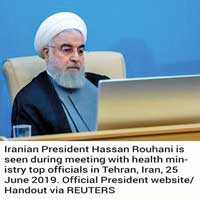Sunday Feb 15, 2026
Sunday Feb 15, 2026
Thursday, 4 July 2019 00:41 - - {{hitsCtrl.values.hits}}
Geneva/Dubai (Reuters): Iran will boost its uranium enrichment after 7 July to whatever levels it needs beyond the cap set in the landmark 2015 nuclear deal, President Hassan Rouhani said on Wednesday, defying US efforts to force Tehran to renegotiate the pact.
Iran announced this week it has stockpiled more low-enriched uranium than is permitted under the accord, a move that prompted US President Donald Trump - who withdrew the United States from the deal last year - to warn Iran was “playing with fire” 
European co-signatories said on Tuesday they were “extremely concerned” by Tehran’s apparent breach of the deal while Israel said it was preparing for possible involvement in any military confrontation between Iran and the United States.
“Our level of enrichment will no longer be 3.67. We will put this commitment aside by whatever amount we feel like, by whatever amount is our necessity, our need. We will take this above 3.67,” said Rouhani, according to IRIB news agency.
Uranium refined to a fissile purity of 3.67% is deemed suitable for electricity generation and is the maximum allowed by the deal. Enrichment to 90% yields bomb-grade material.
He said that if the other signatories do not protect trade with Iran promised under the deal but blocked by Trump’s re-imposition of tough sanctions, Iran would start to revive its Arak heavy-water reactor after 7 July.
As required by the accord, Iran said in January 2016 that it had removed the core of the reactor and filled it with cement.
“From (7 July) onward with the Arak reactor, if you don’t operate (according to) the program and time frame of all the commitments you’ve given us, we will return the Arak reactor to its previous condition,” said Rouhani.
“Meaning, the condition that you say is dangerous and can produce plutonium,” he said, referring to a key ingredient in a nuclear weapon. “We will return to that unless you take action regarding all your commitments regarding Arak.”
He kept the door open to negotiations, saying Iran would again reduce its stockpile of enriched uranium below the 300-kilogram limit set by the nuclear pact if signatories Britain, France, Germany, Russia and China honoured their deal pledges.
Tensions between Washington and Tehran have escalated since Trump pulled Washington out of the pact in May 2018 and acted to bar all international sales of Iranian oil, the Islamic Republic’s economic lifeblood.
Washington also accuses Iran of perpetrating explosive attacks that damaged six oil tankers in the Gulf in May and June, something Tehran denies.